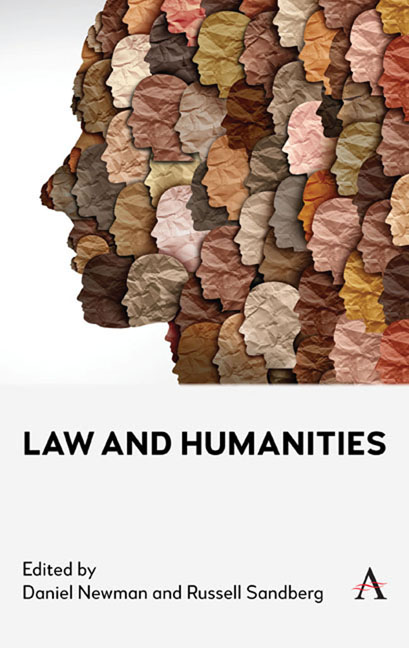Book contents
- Frontmatter
- Contents
- Preface
- List of Contributors
- Chapter One Introducing Law and Humanities
- Chapter Two Law and Archaeology
- Chapter Three Law and Comics/Graphic Justice
- Chapter Four Law and Film
- Chapter Five Law and Geography
- Chapter Six Law and History
- Chapter Seven Law and Literature
- Chapter Eight Law and Philosophy
- Chapter Nine Law and Popular Music
- Chapter Ten Law and Religion
- Chapter Eleven Law and Television
- Chapter Twelve Law and Theatre
- Chapter Thirteen Law and Theology
- Chapter Fourteen Law and Video Games
- Chapter Fifteen Conclusion: Subverting the Law and Humanities Canon
- Index
Chapter Nine - Law and Popular Music
Published online by Cambridge University Press: 27 March 2024
- Frontmatter
- Contents
- Preface
- List of Contributors
- Chapter One Introducing Law and Humanities
- Chapter Two Law and Archaeology
- Chapter Three Law and Comics/Graphic Justice
- Chapter Four Law and Film
- Chapter Five Law and Geography
- Chapter Six Law and History
- Chapter Seven Law and Literature
- Chapter Eight Law and Philosophy
- Chapter Nine Law and Popular Music
- Chapter Ten Law and Religion
- Chapter Eleven Law and Television
- Chapter Twelve Law and Theatre
- Chapter Thirteen Law and Theology
- Chapter Fourteen Law and Video Games
- Chapter Fifteen Conclusion: Subverting the Law and Humanities Canon
- Index
Summary
Introduction: A Developing Tune
This chapter focuses on law and music, emphasising the engagement by law and humanities scholars with popular music. It is in five parts. The first part identifies a long-standing ‘minor jurisprudence’ concerned with the parallels and cross-fertilisations between legal theorising and musicology, most often depicting judging/lawyering as forms of creative performance. In the second part it is identified that these explorations parallel more doctrinal scholarship on the legal forms – especially copyright – that surround music in the popular space. The third part discerns an area of law and popular music scholarship that emerged in the 1980s and 1990s, formed from traces of textual signifiers in Critical Legal Studies (CLS) scholarship and the expanding of law and literature to a broader enterprise concerned with law and popular culture. The fourth part identifies law and popular music scholarship where music is seen as a challenge to the legal orthodoxy. In this work, there is the utilisation of popular music, particularly songwriters and their lyrics, as manifesting a cultural zeitgeist: the musician as the voice of a generation in protest against a legally embedded orthodoxy. The fifth part considers a trajectory within law and popular music of construing popular music as articulating a ‘popular jurisprudence’. This focus has a connection with the earlier ‘minor jurisprudence’ of legal theory and musicology. It identifies in the cultural project of popular musicians – their lives, lyrics, videos, album art, political and cultural legacies, and social media presences – an articulation, and critique, of received legal forms. Through singing, dancing and creating in the mainstream, fundamental legalities are presented, questioned and reappropriated.
‘Minor Jurisprudence’ of Law and (Mostly Classical) Music
Law and music have a long-intertwined history. First Nations peoples of Australia describe essential legal relations with Country as ‘songlines’: that the proper relations between land, law and peoples are connected though song. In the mythmaking of J. R. R. Tolkien’s The Silmarillion, his world and peoples and the discord they experience are constituted from the singing of ‘Great Music’ by the godhead Eru and angelic-like Ainur. However, the posited and doctrinal focus of the modern Western legal tradition has tended to be deaf to the potential foundational intertwining of law and music. Peter Goodrich has suggested: ‘Just as music has historically paid little attention to writing, law – cold prose, serious social speech – has generally marginalised music.’
- Type
- Chapter
- Information
- Law and Humanities , pp. 143 - 158Publisher: Anthem PressPrint publication year: 2024

